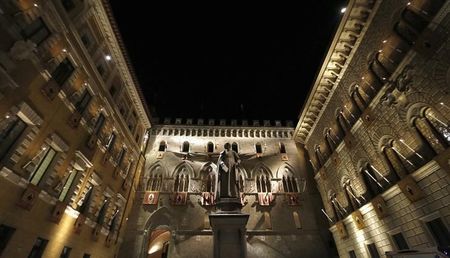By Steve Slater and Sudip Kar-Gupta
LONDON (Reuters) - Shares in Italy's Monte dei Paschi slumped on Monday after an industry health check found it had the biggest capital hole to fill among European banks.
In all, 25 euro zone banks failed landmark health checks that were released on Sunday, and 14 still had a capital shortfall at the end of September, although the results were generally better than analysts had expected.
Shares in Monte dei Paschi were down 17 percent at 0910 GMT after the "stress test" showed it still had a 2.1 billion euro capital hole to fill, even after its fundraising efforts this year. Italian peer Banca Carige, which also needs to find capital, slumped 15 percent.
British state-backed Lloyds Banking Group fell 2.3 percent after the tests showed it had the weakest capital position among major banks, raising doubts it would restart its dividend this year.
The European banking index was down 0.5 percent at 194.7 points by 0910 GMT, after an early rise ran out of steam amid mixed views on whether the tests had been stringent enough and would bring wary investors back to European banks.
"There are risks still in the sector but this is a small step in the right direction," said Gary Paulin, co-founding partner of equity brokerage Aviate Global.
"Apart from the 25 banks with capital shortfalls, the release should act as a positive catalyst, as it clears a negative risk that's hovered over the sector for most of this year. By removing uncertainty, it should help lower funding costs, especially in the periphery," he added, referring to banks in countries around the edges of the euro zone that were hit hardest in the financial crisis.
Gainers were led by Austria's Erste Bank and Raiffeisen and Germany's Commerzbank, whose shares rallied more than 5 percent after each came out better from the test than some investors and analysts had feared.
Citigroup analysts said Commerzbank was one of the euro zone banks to "demonstrate a better-than-expected headline outcome on AQR (asset quality review) and/or the stress tests," and that the result should alleviate some capital concerns.
The aggregate shortfall of 9.5 billion euros (7.5 billion pounds) at the end of September for 130 of Europe's top banks was less than predicted and showed the biggest problems still existed for lenders in Italy, Cyprus and Greece.
OVERVALUED LOANS
Monte dei Paschi needs to find more funds -- to add to a 5 billion euro capital increase in June -- and could be forced to seek a merger, another rights issue or asset sales. It has hired Citigroup and UBS as advisers on its options.
Lloyds was downgraded to "underperform" by Jefferies analyst Joe Dickerson after the results, which raised concern it could fare even worse in a test by UK regulators in December.
"We do not expect a material dividend until 2016," said Dickerson.
For many banks, the biggest impact of the tests was not in identifying capital holes but in finding that their assets, such as loans, had been overvalued.
The European Central Bank said banks had been valuing their loans and assets at 48 billion euros more than they were really worth. That was because they had not recognised 136 billion euros of bad loans.
Not all analysts and investors were convinced the European test was tough enough and said the capital shortfall identified was not realistic, but they added it at least shone a light on trouble spots.
"Everyone will be looking hard to decide whether the 9 billion (euros) is too little to shore up the banks that are at risk," said Salman Ahmed, global fixed income strategist at Lombard Odier Investment Managers.
"The good news is that the review process is fully transparent. Investors have been handed plenty of data on the banks' assets and are now in a position to judge for themselves."
The test of banks provides the clearest picture yet of the health of the euro zone's banks more than seven years after the eruption of a financial crisis that almost bankrupted a handful of countries and threatened to fracture the currency bloc.

(Additional reporting by Matt Scuffham and Thomas Atkins; Editing by Mark Potter)
